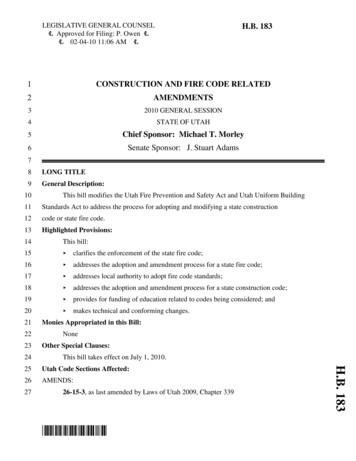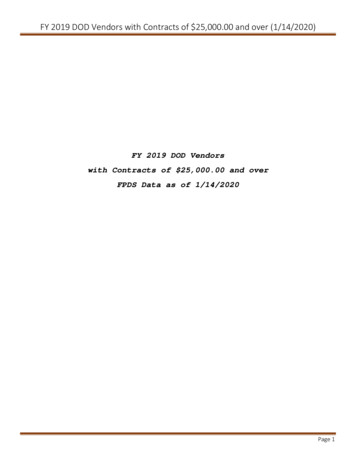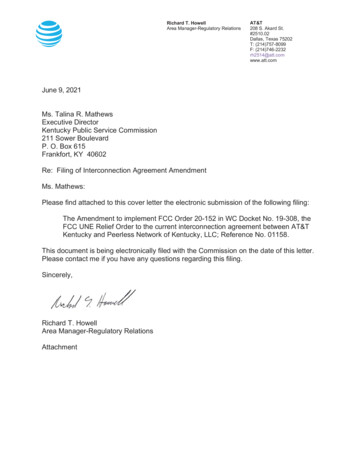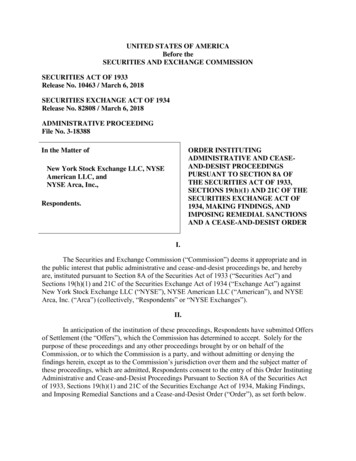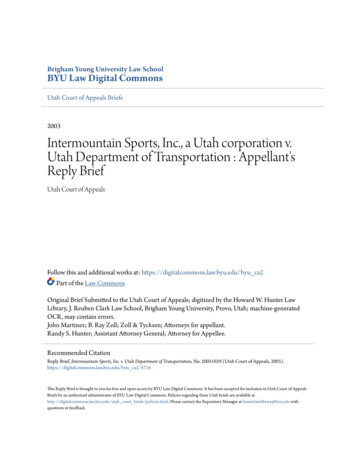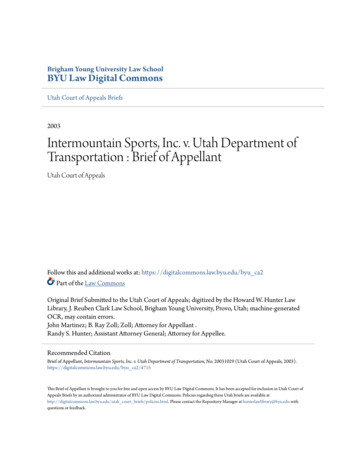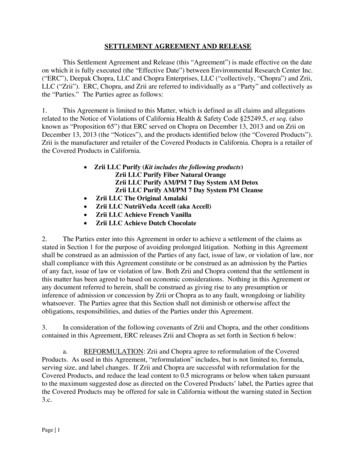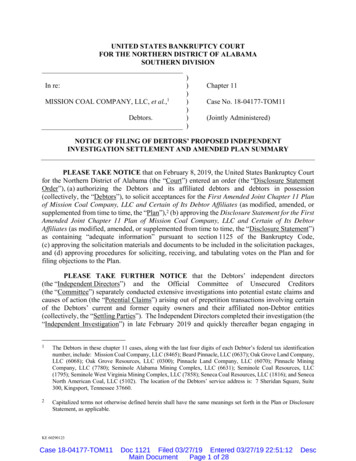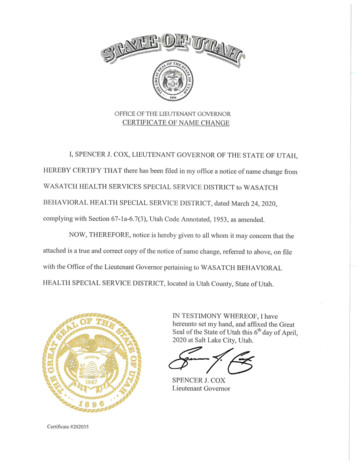
Transcription
6405 S OUTH 3000 E AST , S UITE 150S ALT L AKE C ITY , U TAH 84121801-527-1040WWW . YORKHOWELL . COMUTAH’S NEW LLC ACTWhat You Need to KnowLimited Liability Companies In GeneralFirst created in Wyoming in 1987, Limited Liability Companies (“LLCs”) have becomethe preferred entity in most circumstances to operate a business, hold assets, and invest invarious activities. Initially created to merge the liability protections of a corporation with the taxflexibilities of a partnership, LLCs are now used in a whole host of different situations.From a liability standpoint, LLCs can be used to compartmentalize risk associated withdifferent ventures or activities and can also be used to appropriately limit the rights of potentialcreditors with respect to the owners of the LLC. From a management standpoint, LLCs canoperate on a majority rules basis similar to a corporation, or one or more specific people orentities, known as Managers, can be charged with managing the LLC (similar to the generalpartner of a limited partnership). From a tax standpoint, a single-Member LLC can bedisregarded as a separate entity (in which case its’ earnings are taxed to the Member), taxed as apartnership (provided there are two or more Members), or even taxed as an “S” corporation or“C” corporation. Because of all of these potential options, LLCs can be specially crafted usingdifferent combinations to achieve a wide variety of objectives.Understanding the TermsAlong with the creation of this new type of entity, new terminology came about as well:Members – The owners of the LLC. Under Utah law, an LLC can have one Member ormultiple Members. Members own Member Interest in the LLC.Managers – The persons or entities assigned to oversee the operations of the LLC.Articles of Organization - Now called Certificates of Organization under the New Act,this is the document filed with the State to officially create the LLC. It contains theinformation necessary to organize the LLC (i.e., Name of the LLC, mailing Address,IRS CIRCULAR (230) DISCLOSURE: To insure compliance with requirements imposed by theIRS, we inform you that any tax advice contained in this communication, unless expressly statedotherwise, was not intended or written to be used, and cannot be used, for the purpose of (i)avoiding tax-related penalties under the Internal Revenue Code or (ii) promoting, marketing orrecommending to another party any tax-related matter(s) addressed herein.
names and addresses of Managers (or names and addresses of Members if MemberManaged)).Operating Agreement – An agreement among the Members that governs the operationsof the LLC, including the allocation of profits and losses, decision-making, and thetransferability of Member Interest. The Operating Agreement should be in written form,but Utah law also allows oral Operating Agreements.Member Managed – Refers to LLCs that are managed or controlled by the Members,similar to a corporate structure where Shareholders vote by majority vote on variousmatters.Manager Managed – Refers to LLCs that are managed or controlled by one or moreindividuals or entities (Managers). Under Utah Law, a Manager is not required to also bea Member.Charging Order – An order, obtained from a court by a judgment creditor, by which theproperty (including a Member’s membership interest in an LLC) of a judgment debtor is“charged” with the payment of the debtor’s obligations to the creditor. In general, acharging order limits the creditor of a debtor-Member to the debtor’s share ofdistributions from the LLC, without conferring on the creditor any voting or managementrights.Transferee – Under the New Act, a recipient of a membership interest in an LLC whohas the right to receive distributions (if made) in respect of such interest, but who,without the consent of the Members of the LLC as provided in the Operating Agreement,does not become a Member of the LLC, and who is not entitled to participate in themanagement or conduct of the LLCs business, nor have access to records or informationconcerning the LLCs activities.New Limited Liability Company ActEffective January 1, 2014, Utah adopted a complete revision to the laws governing LLCsin the State of Utah, in a series of laws entitled the Utah Revised Uniform Limited LiabilityCompany Act (the “New Act”). These changes mark the first major overhaul of the LLC statutesin the State of Utah in more than 15 years. These changes will not only affect future LLCscreated in the State of Utah, but will also affect LLCs already in existence. For the first twoyears of the New Act’s effectiveness, existing LLCs can opt into the New Act, but otherwise theNew Act will not apply to LLCs that existed prior to January 1, 2014 until January 1, 2016.IRS CIRCULAR (230) DISCLOSURE: To insure compliance with requirements imposed by theIRS, we inform you that any tax advice contained in this communication, unless expressly statedotherwise, was not intended or written to be used, and cannot be used, for the purpose of (i)avoiding tax-related penalties under the Internal Revenue Code or (ii) promoting, marketing orrecommending to another party any tax-related matter(s) addressed herein.
Discussion of a few of the primary, high-level changes arising from the New Act follows:1.Certificate of Organization. Certificates of Organization have now replaced theArticles of Organization as the required document to file with the State in order to create anLLC. Besides just changing the name of the form, the New Act no longer requires initial publicdisclosure of the identities of the Members of a Member Managed LLC or all of the Managers ofa Manager Managed LLC. The only information that now must be publicly disclosed when anLLC is created is: (a) the name of the LLC, (b) its’ street and mailing address, and (c) the nameand address of the registered agent. However, within a year of creation, each LLC must file anannual report, listing at least one “Governing Person”, who should be a Manager, Member, ortop-level executive.2.Statements of Authority. It is our experience that when interacting with lenders,investors, and other potential creditors and business relationships, such persons and entities willrequire that a public record exist, identifying and authorizing the appropriate individuals, whomay sign documents on behalf of the LLC. Therefore, the New Act permits an LLC to file apublic record called a Statement of Authority, which may list some or all of the individuals whocontrol or govern the LLC. Under the New Act, it will be important for business owners, whencontemplating any potential deal, to proactively ensure that their Certificates of Formation and/orStatements of Authority properly balance privacy with practicality.3.Oral Operating Agreements. In the past, prior law provided certain “default”provisions to govern the rights and responsibilities of LLC members in absence of a writtenOperating Agreement—in order to avoid such default provisions, Members were required toenter into a written Operating Agreement. However, the New Act now provides that OperatingAgreements may be established orally, or even based upon the actions and “course of dealing” ofthe Members and Managers of an LLC. Indeed, there is some concern among lawyers that,because of how the New Act is drafted, such “course of dealing” may be inferred to trump animproperly drafted, written operating agreement. This is a significant potential problem, becauseLLC members may find themselves in a situation where, despite what they believe theirOperating Agreement to be, their historical actions or communications may legally alter theagreement, creating confusion, contention, controversy, and even potential litigation. Forexample, one Member could allege that a verbal agreement changed the voting rights, allocationof ownership of Member interest, or other important provision of the Operating Agreement, andsuch agreement could become binding on the other Members. This new provision could alsoapply to circumstances or situations that aren’t addressed in a current written OperatingAgreement. Finally, if someone becomes a new Member in an LLC that doesn’t have acomprehensive Operating Agreement, that Member could be bound to the oral agreements orprior conduct of which the new Member isn’t even aware.Due to the foregoing, it is critical that each LLC have a written Operating Agreement, sothat each of the members is aware of the deal among all of them, and each Member’s rights andresponsibilities are clearly defined. A conscientious lawyer will also draft an OperatingIRS CIRCULAR (230) DISCLOSURE: To insure compliance with requirements imposed by theIRS, we inform you that any tax advice contained in this communication, unless expressly statedotherwise, was not intended or written to be used, and cannot be used, for the purpose of (i)avoiding tax-related penalties under the Internal Revenue Code or (ii) promoting, marketing orrecommending to another party any tax-related matter(s) addressed herein.
Agreement that eliminates the potential problem of historical “courses of dealing”unintentionally altering the written agreement.4.Improved Asset Protection. The New Act allows for several new provisions thatcould be added to an Operating Agreement that would enhance the overall asset protectionbenefits of an LLC.a.Creditor Rights as a Member – In the past, if a Member loaned money to the LLCthat also had non-Member creditors, the Member was required to stand in lastposition behind the non-Member creditors, in order to be repaid. The New Actallows a Member to be placed on the same level as non-Member creditors.b.Charging Orders – If a Member has an outside creditor, that creditor could obtaina Charging Order against the Member’s LLC interest. In such a case, the creditorwould then be entitled to receive any distributions from the LLC that would haveotherwise been made to that Member. In addition, the creditor could alsoforeclose on the Member’s interest and become a mere Transferee interest holderin the LLC (see definition of Transferee above). One significant change in theNew Act is the specification that compensation received by an LLC manager isnot considered a “distribution” for the purposes of a creditor’s Charging Order.c.Information and Notice – In order to ensure that creditors of one member do notcause undue problems for the LLC as a whole, the operating agreement should bedrafted to carefully specify what types of information rights any charging ordercreditors may receive. Furthermore, each LLC’s Certificate of Organizationshould, if applicable, place potential creditors on notice of any restrictions ontransfer that may exist with regard to the members’ interests, as doing so may(under the New Act) help to create more safety for the remaining members of thecompany.5.Increased Options. The New Act has increased certain standards of conduct forthose managing LLCs. Specifically, a Manager’s duty of loyalty, the disclosures that arerequired to be given to Members, the obligations of good faith and fair dealing, and theobligation of a Manager not to compete with the business of the LLC, have all been increased bythe New Act. While the New Act applies these greater fiduciary responsibilities on theManagers, these increased responsibilities can also be dramatically reduced or limited by theterms of a written Operating Agreement. Accordingly, the terms and conditions of an OperatingAgreement can be significantly slanted to either the Members’ or the Managers’ favor,depending upon the circumstances. This means that a one size fits all approach to OperatingAgreements will likely not make sense under the New Act.6.Prior LLC law required a two-thirds majority of the members to approve a sale,liquidation, merger, or other large change in the business. The New Act’s default provisionIRS CIRCULAR (230) DISCLOSURE: To insure compliance with requirements imposed by theIRS, we inform you that any tax advice contained in this communication, unless expressly statedotherwise, was not intended or written to be used, and cannot be used, for the purpose of (i)avoiding tax-related penalties under the Internal Revenue Code or (ii) promoting, marketing orrecommending to another party any tax-related matter(s) addressed herein.
instead provides that 100% of the members must consent to any such decision. This provision isintended to protect minority equity holders from being overrun by another majority member, butmay be impractical, especially in the family and closely-held company setting.General RecommendationsBased on the above discussion, we have the following general recommendations foreffectively using LLCs in the State of Utah:1. File a New Certificate of Organization. Filing a new Certificate of Organizationwould potentially allow you to keep more information about your LLC private. Sincethe new Certificate of Organization does not require the names and addresses of theManagers or Members, you could keep more of this information anonymous and nototherwise available on the State’s public website.2. Use Manager Managed LLCs. Manager Managed LLCs should be used in virtuallyevery Operating Agreement. Control and management is much simpler in a ManagerManaged LLC and Managers can, under the New Act, continue to receivecompensation even if they are subject to a Charging Order.3. Adopt the New Act. Most existing LLCs’ Operating Agreements have provisionsthat mirror the old law and, as a result, those LLCs will not receive the assetprotection and liability protections of the New Act unless they formally adopt theNew Act through a new Operating Agreement.4. Prepare and Implement a Comprehensive Operating Agreement. If you fail tohave a Operating Agreement, or if your Operating Agreement fails to address certainkey issues, then your LLC may be subject to verbal agreements or prior operations.This could cause great uncertainty and unnecessary conflict. It is critically importantto have your Operating Agreement reviewed to ensure that it deals with any and allmajor issues that your LLC could face and you avoid issues arising from the New Actallowing for verbal agreements.5. Consider Using a Commercial Registered Agent. An LLC is required to file anAnnual Report with the State of Utah to maintain its’ legal existence. Failing to filethis Report can result in the LLC losing the liability protection for its Members.LLCs should consider hiring a commercial Registered Agent to ensure that thisrequirement is met. A commercial Registered Agent would also be able to receiveany legal notices or filings for and on behalf of the LLC.York Howell is a boutique law firm focused exclusively on Estate Planning, Business Planningand Transactions, Asset Protection, Tax Planning and Charitable Giving. More information andresources can be found at www.yorkhowell.com.IRS CIRCULAR (230) DISCLOSURE: To insure compliance with requirements imposed by theIRS, we inform you that any tax advice contained in this communication, unless expressly statedotherwise, was not intended or written to be used, and cannot be used, for the purpose of (i)avoiding tax-related penalties under the Internal Revenue Code or (ii) promoting, marketing orrecommending to another party any tax-related matter(s) addressed herein.
Agreement. Finally, if someone becomes a new Member in an LLC that doesn't have a comprehensive Operating Agreement, that Member could be bound to the oral agreements or prior conduct of which the new Member isn't even aware. Due to the foregoing, it is critical that each LLC have a written Operating Agreement, so

